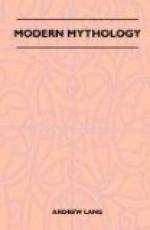What is the Dark One
That goes over the earth,
Swallows water and wood,
But is afraid of the wind? &c.
Or we find,
What is the gold spun from one window to another?
The answers, the obvious answers, are (1) ‘mist’ and (2) ‘sunshine.’
In Mr. Max Muller’s opinion these riddles ’could not but lead to what we call popular myths or legends.’ Very probably; but this does not aid us to accept the philological method. The very essence of that method is the presumed absolute loss of the meaning of, e.g. ‘the Dark One.’ Before there can be a myth, ex hypothesi the words Dark One must have become hopelessly unintelligible, must have become a proper name. Thus suppose, for argument’s sake only, that Cronos once meant Dark One, and was understood in that sense. People (as in the Norse riddle just cited) said, ‘Cronos [i.e. the Dark One—meaning mist] swallows water and wood.’ Then they forgot that Cronos was their old word for the Dark One, and was mist; but they kept up, and understood, all the rest of the phrase about what mist does. The expression now ran, ’Cronos [whatever that may be] swallows water and wood.’ But water comes from mist, and water nourishes wood, therefore ‘Cronos swallows his children.’ Such would be the development of a myth on Mr. Max Muller’s system. He would interpret ‘Cronos swallows his children,’ by finding, if he could, the original meaning of Cronos. Let us say that he did discover it to mean ’the Dark One.’ Then he might think Cronos meant ‘night;’ ‘mist’ he would hardly guess.
That is all very clear, but the point is this—in devinettes, or riddles, the meaning of ‘the Dark One’ is not lost:—
’Thy riddle is easy
Blind Gest,
To read’—
Heidrick answers.
What the philological method of mythology needs is to prove that such poetical statements about natural phenomena as the devinettes contain survived in the popular mouth, and were perfectly intelligible except just the one mot d’enigme—say, ‘the Dark One.’ That (call it Cronos=’Dark One’), and that alone, became unintelligible in the changes of language, and so had to be accepted as a proper name, Cronos—a god who swallows things at large.
Where is the proof of such endurance of intelligible phrases with just the one central necessary word obsolete and changed into a mysterious proper name? The world is full of proper names which have lost their meaning—Athene, Achilles, Artemis, and so on but we need proof that poetical sayings, or riddles, survive and are intelligible except one word, which, being unintelligible, becomes a proper name. Riddles, of course, prove nothing of this kind:—
Thy riddle is easy
Blind Gest
To read!




